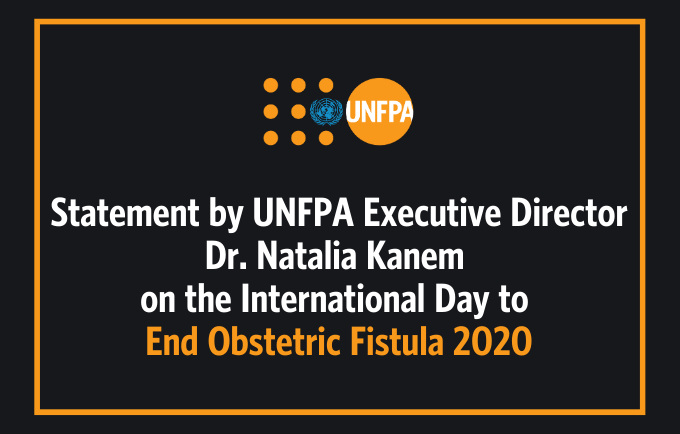Statement by UNFPA Executive Director Dr. Natalia Kanem on the International Day to End Obstetric Fistula, 23 May 2020
Last November, the world convened in Nairobi to celebrate the tremendous gains of the past 25 years in advancing the health and rights of women and girls. With a deep sense of urgency, purpose and hope, leaders from around the world – from presidents to the grassroots, from refugees to royalty, from youth activists to CEOs – committed to accelerating action to ensure sexual and reproductive health and rights for all.
Just six months later, that commitment is being tested like never before. As health systems struggle to respond to COVID-19, the pandemic stands to take a huge global toll on maternal and newborn health. Already, the crisis is compounding the economic, social and logistical barriers that women and girls face in accessing sexual and reproductive health services. Even where services are available and accessible, fear, misinformation and stigma related to COVID-19 are deterring some pregnant women from seeking obstetric care.
The absence of timely medical treatment will likely spur a dramatic increase in obstetric fistula, a serious childbirth injury resulting from prolonged, obstructed labour.
Poor women and girls in rural areas are especially at risk. The disproportionate incidence among the poor of this debilitating and sometimes life-threatening condition is a reflection of social and economic inequities and of unequal enjoyment of the right to health, including sexual and reproductive health. Even in the best of times, they are more likely to lack access to skilled health personnel. Child marriage and early childbearing are among other contributing factors.
While fistula has been virtually eliminated in developed nations, hundreds of thousands of women and girls in the developing world still live with this debilitating condition. As leader of the global Campaign to End Fistula, UNFPA provides funding and support for fistula prevention, treatment and social reintegration programmes. Since 2003, we have enabled more than 113,000 women to undergo obstetric fistula repair surgery.
However, we will need to accelerate efforts if we are to achieve our global ambition of ending fistula by 2030, the deadline for the Sustainable Development Goals. Towards that end, the response to the COVID-19 pandemic must ensure the delivery of essential sexual and reproductive health services, including midwifery services and emergency obstetric care.
On this International Day to End Fistula, the memory of the late Dr. Catherine Hamlin, who passed away in March this year, looms large. She dedicated most of her long life to treating women and girls with fistula, focusing not only on the physical injury itself, but also on the scars created by stigma and discrimination. Her charitable organization, Hamlin Fistula Ethiopia, has brought hope and healing to women and girls, raised global awareness of fistula and spurred innovative efforts to end it.
Let us work in Dr. Hamlin’s memory towards fulfilling her lifelong dream and our long-held aspiration to eliminate this preventable condition. In doing so, we will help protect the health and human rights of the poorest and most vulnerable women and girls.




